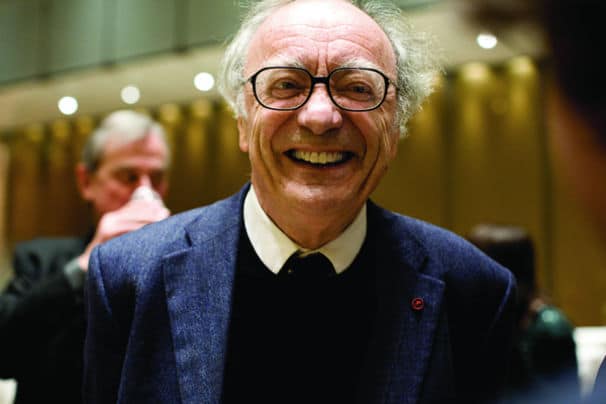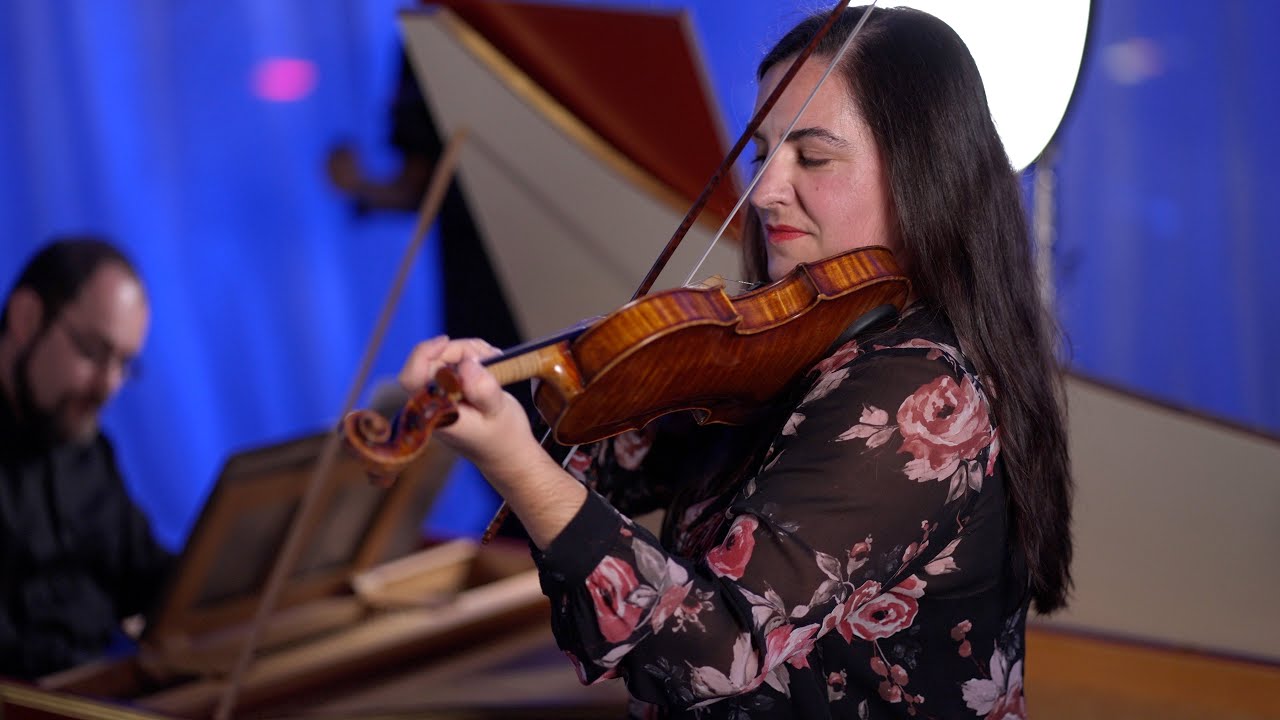The violin competition system is broken
mainIt keeps producing uninteresting winners. Now why is that?
John Marks has some thoughts:
The problem is, violin competitions give prizes to violinists who play like violin-competition winners. At least in musical terms, that is not always a good thing. Most of the people I associate with, pretty much know what “playing like a violin-competition winner” means. If any of you general readers are in doubt, let me take a stab at a definition:
Playing like violin-competition winner means playing with amazing facility and (usually) fluidity, but too often in a reductionistic way that reduces great music to a series of technical challenges, empty gestures, or opportunities for showing off.
More?
How about: Hyper-fast playing, to the point of an unnatural lack of musicality; a hard-edged, relentlessly brilliant sound (think of your flat screen TV’s “Enhanced Edge Definition”); exaggerated articulation (ditto); playing loudly and with a lack of dynamic nuance; a lack of emotional engagement and range (which is not made up for by the usual constant and exaggerated facial expressions); in some cases, a tendency to play slightly sharp (in order to “stand out”); in some cases, a generalized lack of musical good taste; and a dead-serious earnestness, to the point of missing musical jokes, parodies, and satire.
The bottom line: Your usual Competition Winner can be relied upon to have weapons-grade bowing and a stupefyingly agile left-hand technique in the service of music-making that is often uninvolving and ultimately forgettable.
More here.






Richard LIn is quite the opposite of an uninteresting winner. He is an absolutely riveting player in the great tradition of the Golden age and far and away the favorite of at least those musicians that I talked to in the Indianapolis symphony, who rehearsed and accompanied all the finalists and whose opinion I trust more far more than that of a former music educator who rants about the “excesses of Heifetz”. His suggestions- no Mendelssohn or Tchaikovsky allowed, Bruch G minor instead and Prokofiev 1 instead, no violinist judges- because singers, pianists and conductors will get a better result! Everything he writes evidences abosultely zero contact with the reality of what it takes to sort through a 147 talented violinists in a fair and meaningful way.
I’m sorry for him that his guy didn’t win, but do take the time to read the linked piece. It is painfully naive and ignorant. Among the top prize winner in Indianapolis are Leonidas Kavakos, Judith Ingolfsson, Sergey Khachatryan, Simone Lamsma, Ida Kavafian, Augustin Hadelich, and Benjamin Beilman. That’s a lot of major careers for only 9 previous iterations and a lot of interesting personalities. They are one of the few that usually do it right. I think I’ll trust their system of that of this passionately disappointed former music educator.
n.b. the article was by a guest blogger, not written by John Marks
Please note that “The Mendtchaik Madman” stated that Mr. Lin “was, by far, not the worst of the lot.”
Re: that nom de plume, does anyone remember “The Cavpag Madman”?
Ciao,
John Marks
Exactly.
Thanks for posting.
Please clarify what your “exactly” applies to.
That Mr. Lin was not at all the worst offender, or the long-ago critic who went ballistic over cramped and limited opera programming?
Mr. Lin is a very fine player. But one might conclude that his Mozart lacked dynamic nuance and also lacked that je ne sais quoi of Mozartean lightness and elegance, even compared to Ms. Hokamura’s. Furthermore, his Scottish Fantasy was a non-challenging choice in musical terms, especially compared to Ms. Goicea’s remarkable although perhaps tragically under-rehearsed Shostakovich 1, which, by the way, we would have also heard from Mr. Rudin had he been advanced to the Finals.
If there was a finer piece of fiddling at IVCI than Ms. Goicea’s Shostakovich 1’s Passacaglia and Cadenza, I did not hear it. Have any of the commenters here actually LISTENED to that? Criminy, just do it: https://www.violin.org/warch-archive-streaming
BTW, my friend David Goldman pointed me in the direction of an article he had written almost 10 years ago, that IMHO nails it:
A simple way to think of the problem is this: The sense of a future in Western classical music evokes the basic emotions with which human beings regard the future, namely hope and fear. When Israeli musicians speak of performing with a sense of risk, they mean the capacity to sustain hope in the presence of fear. It takes a certain kind of personality to do this on the concert stage, with all the attendant artistic and technical demands. Israel, whose existential premise is the triumph of hope over fear, incubates a disproportionately large number of musicians with this sort of personality.
Western conservatories, by contrast, tend to penalize risk-taking. Their graduates are taught to launch careers by winning competitions, and the default strategy for taking a competition prize is to make the fewest mistakes. The conservatory-and-competition circuit tends to manufacture risk-averse savants who play with the spiritual equivalent of surgical gloves.
# # #
To “the default strategy for taking a competition prize is to make the fewest mistakes” I would add, “and to avoid unfamiliar, challenging, or deceptively easy-to-play works, and to stick to the empty-calorie crowd-pleasers, such as Tchaikovsky’s concerto and any and all Carmen Fantasies.”
Because, if you use a certain toolbox of criteria, Eugene Fodor was the greatest violinist in history, and I think that would be a sad state of affairs. Enough to drive a retired educator mad, I’d say!
ATB,
John Marks
Editor, The Tannhauser Gate
If David Garrett was young, this could be the description of his unnatural fast, commercalized, sex-symbol alike “artistry”
Despite having had a good education, his attitude and the way he plays regarding style is disgusting and he should better be a midel for the yellow press cover. Most women seem to like his looks…
I tjink, he is overrated, selfish, superficial, in love with himself, so narcistic
And he is a pop star, but not a diamond in the classical music world.
We live in a democratic country here, so critics id allowed…
Pls delete my previous posting. Thank you
Correction:
If David Garrett was young, this could be the description of his unnatural fast, commercialized, sex-symbol alike “artistry”
Despite having had a good education, his attitude and the way he plays regarding style is disgusting and he should better be a model for the yellow press cover. Most women seem to like his looks…
I think, he is overrated, selfish, superficial, in love with himself, so narcistic
And he is a pop star, but not a diamond in the classical music world.
We live in a democratic country here, so critics is allowed…
Umm…but David Garrett has won an audience. Which is the key requirement for a solo career.
I aboslutely share Your opinion!
Nowadays only perfect Intonation counts and very often, the Violinist who played the least Musical wins because he offended the least people. And another topic, but You should do an article about politics in competitions!
Why are there still relativley big competitions without Livestreams? F. E. Enescu competition, Kreisler Competition etc?
Why is it, that this Year 70 (!!!) player were allowed to the first round?
Later in my life i want to start an own Competition, without any politics, with Not only Violinist ans pedagoges in the Jury, but more importantly having MUSICIANS in the jury. All of them have to show how they voted in public and have an Open Q&A Session with musicians ans audience, giving them the opportunity to really see If the judge can argument and explain why he voted like that. I would give Special prices such as “most tasteful playing of …” Or the Mozart price BUT really having classical anderen baroque experts anderen musicians in the Jury for this round!
Why is there No Competition with different Jurys in different rounds? The Last round maybe world famous soloists, Chamber musicians and conductors?
Its just a shame that nowadays Managers only SEE If someone is famous so they can get a piece of cake, instead of trusting their ears and trying to Help Young MUSICIANS. that is the Problem with our society today. The winners are famous but Robots. They get relevant for 1 Year and than disappear because they Play Like Robots…
@Anonymous
Not all competitions have live-streams because live-streaming (to any suitable degree of quality) is an expensive operation (and all the more so if there’s an orchestra involved in the finals). Broadcasters are frequently not interested, and the cost of setting-up, directing, and running a live-stream (in effect, a TV broadcast but via a different medium, but still comes with all the complications of tele) is substantial. (I speak from experience of having set up and produced several). Not many competitions are able to raise the funding or sponsorship to make that happen; and that’s quite aside from a ‘is-it-even-worthwhile?’ calculation around how many people might bother to watch it.
As for competition juries, plenty exist which are a combination of performers, teachers, managers, recording producers, promoters, and other specialists; this is not a new idea. And competitions also exist where the jury membership changes from early round(s) to the final. (I’ve sat on jury panels which fulfil both of those criteria).
The author quotes a “professional observer” to back up their claims.
That observer is Laurie Niles who runs violinist.com. She is an amateur violinist…i’m not sure how that makes her a professional observer.
“Mendtchaik Madman” later states who HE thought should have advanced. Okay thanks for letting us know that you think violin competitions are dead because your favorite didn’t make it to the finals.
It’s absolute drivel.
FYI:
Our founder and editor is Laurie Niles, a professional violinist (AFM Local 47, Los Angeles) who has played with the Pasadena (Calif.), Omaha (Neb.) and the late Disney All-American and Colorado Springs Symphonies. She holds a master’s degree in journalism from Indiana University, where she studied violin with Henryk Kowalski, and an undergraduate ad hoc degree from Northwestern University in violin performance and journalism. She is a Suzuki-certified teacher through book 10 and maintains a studio of a dozen students, in addition to performing and editing this site.
Hmmmmm… a bit of mistaken class snobbery on your part, perhaps?
John Marks
Editor
The Tannhauser Gate
It should also be noted:
Norman Lebrecht writes something untrue and insulting about the Indianapolis violin competition whenever it occurs (every 4 years).
He just doesn’t like the competition for whatever reason and tries to discredit the winners by any means necessary.
Maybe they didn’t allow him press coverage or something? I have no idea.
It’s very concerning though.
The whole musical competition business is a sham, designed to elect palatable winners that will play or sing the notes and will not offend. Emasculation and evisceration of individuality and personality. And they better be ultra photogenic and slim as a wire hanger. Selfie culture and social media will tolerate no less. It is the era of Barbie and Ken and the consequences of that.
“Competitions are for horses” — Béla Bartók
Nathan Milstein judged one, and only one, violin competition during his lifetime. He said the following to a small group of us at his master class in Zurich Switzerland, “The winner thinks he or she is the best and the loser thinks he or she is the worst, neither of which is necessarily true.”
Don’t take contest-level technique and tone for granted. The conservatories still churn out plenty of very able violinists who are lacking in both. The continued population of second violin sections is secure well into the future.
I like genuine individuality as much as the next guy – Francescatti, Szigeti, Huberman, Grumiaux, Ricci; how could you not recognize their playing after the first measure? People have been grousing about this “they all sound alike” since the beginning of competitions, and before then, it was about Sevcik pupils, then about Flesch pupils, or Persinger pupils. Others believed that everything started to go to hell when recordings became available because it made it so much easier for examples to be set for many, many others to try to copy.
I had the chance to hear Tessa Lark this summer – she placed second in Indianapolis a few years ago and has been playing the Gingold Strad (the first place winner didn’t want it, and it has the reputation of being a tough nut to crack) from then till now when she had to give it back. Tchaikovsky Concerto; conductor was Victor Yampolsky (son of Oistrakh’s long-time pianist and himself a pupil of Oistrakh). There was the expected polished technique and lovely tone of a competition winner but it was also a very interesting and individual interpretation, without being distorted or just bizarre. Perhaps the fact she is also a jazz and bluegrass violinist has some role to play. If doing so well at Indianapolis got her the management and the PR and led to her getting this particular gig, I was the beneficiary. No complaints here.
A strong endorsement of David K. Nelson’s comment. Tessa Lark is making a significant impact in the world of classical music and beyond. I also saw Tessa over the summer – at the Chesapeake Chamber Music Festival, where she sold out the house (that counts!) for her special “Stradgrass” program. Even when she is not performing jazz and bluegrass but is delving into repertoire from Bach to Bartok, Tessa has a strong communicative and story-telling voice that is presumably part of what the author is hoping for in violin competition winners.
Going back to last winter, as part of my journalistic activities, I had the opportunity to interview Tessa in a Q&A that got some attention prior to her appearance in the Phillips Collection concert series in Washington. Anyone who’s interested can find the interview at the website for D.C. Metro Theater Arts. Put “Tessa Lark” in the search box and it’ll be one of the links that comes up.
In the context of this conversation, and with the disclaimer that I have no other personal familiarity with the Indianapolis Violin Competition, part of what I think is important is that it doesn’t matter that Tessa Lark got second prize in 2014 rather than first prize. I’ve made this point before in discussions here about piano competitions. What adds to the pressure and controversy over who receives the gold medal in this or that event is the sense that “classical music” or “art music” (or whatever you want to call this field) is shrinking, at least in the American cultural context. That just forces presenters to layer on even more the whole “winner” hype, or think that they have no other marketing tools at their disposal. Second and third prizes, audience prizes, special awards, and just plain discussion of favored artists even in semi-final rounds can be all to the good. I do understand the author’s points, and probably agree with many of them, but in the end the exact awards will always be subjective and someone will be left dissatisfied. I know I would take seriously any comments from those familiar with the 2018 Indianapolis competition about their favorite violinists at the event, particularly anyone who they think can expand the field, award-winner or not. I hope this helps.
There are no musicians, violinists or otherwise of the of the younger generation that are worth listening to. Any musician under 40 is the reason why classical music is dying. After our generation, the art form will collapse into cliche and banality.
Nonsense….. there are enough young musicians (performers) who, to everybody’s surprise, touch the heights. And then, what they to some extent may miss at their age, will develop over the years.
Citing what evidence?
Have you listened to every artist under the age of 40?
If not, how can you even make a statement like that.
This has to be one of the most uneducated ignorant opinions i’ve ever come across on this site.
How embarrassing.
Let me guess, you’re under 40. Open up your ears, and you can hear the decline in standards from the younger generation. It’s okay. It’s not your fault. My generation failed to properly train you.
Igor Levit, pianist, age c.31
Marie-Elisabeth Hecker, cellist age 31
Daniil Trifonov, pianist age 27
… for starters.
These are all overrated players. Technically competent, yet musically shallow.
The fact that a listener does not hear much depth in a musician’s interpretation does not necessarily mean that this musician is shallow. Listeners’ perception of “musical depth” is highly subjective.
“Technically competent but musically shallow”
Well…it takes a while for young musicians to develop their voice. It is silly to expect the same level of artistic interpretation as we would from a fully mature artist.
What about when you know the name of the winner before the competition starts? Look at Vladimir Spivakov Violin Competition, starting today September 17. The Spanish girl born in 2002 is the winner 😉 … Competition finishes on September 21.
Dunno ’bout that (I think I know what you are alluding to, though), but,
OH, THE HUMANITY!!!
Just go to http://vsvc.org/competitors and in the lefthand margin, select EN for “English.”
Poor Olga Golomovzyuk does not even own a violin!!!
All she has is a bow!
She is playing AIR VIOLIN!
Is this an Air Violin competition? NYET!
We must start a GoFundMe so Olga can get at least a Suzuki-Quality violin.
Or, better yet, Putin can get her a Guadagnini, and send the bill to his friend in the White House.
That works for me!
jm
Every time an asian player wins top prize at a competition, there is always this kind of criticism – uninteresting, only technical, unmusical and so on….. Are these 8 judges deaf or what?
Sigh…
I am very very certain that racism does not play any part in the opinions expressed by The Mendtchaik Madman, which I heartily endorse. My prime example for the futility of trying to be “another Heiftez” but without Heifetz’ background of musical culture is not Asian–it’s Eugene Fodor; and may he finally find peace.
THAT SAID, I do have the sneaking suspicion that a blend of conscious and unconscious SEXISM might have had a role in the IVCI results.
Ask the man in the street to visualize what a “violin soloist” looks like. My bet is that the majority will envision a handsome young man wearing black-tie formal attire, while a minority will envision a handsome young man wearing white-tie formal attire. Get my point? (Truth be told, perhaps 1.8% of the respondents might envision Anne-Sophie Mutter wearing a Dior gown… .)
The Mendtchaik Madman’s problem is not that an Asian won first prize; his problem is that the six Laureates, taken as a group or as individuals, tend to play more like violin-competition winner than genuine artists with something meaningful to say that is not, as Carl Jung might put it, not merely a manifestation of the Ego Function.
Sorry to pick out one player, but, please look at and listen to Ms. Anna Lee’s Hubay Carmen Fantasy. Left-hand technique that Ruggiero Ricci might have envied, all in the service of a rather leadenly-earnest hell-for-leather fast ride to nowhere. Asians do not have a monopoly on not getting the concept of “tongue in cheek.” But that is what such a piece needs. It’s like slowing down Elgar’s Nimrod movement to the pace of Princess Di’s funeral march while totally missing the point that Nimrod was “a mighty hunter,” and mighty hunters move along smartly.
One of the world’s foremost experts in one violinistic area (I will not reveal more) was there in Indianapolis and heard it all, and he told me that Fedor Rudin was head and shoulders above everyone else as far as tone production goes. Even over my computer speakers, Rudin’s double-stops in the Poulenc were so luscious… yet he did not advance to the finals. Perhaps because he had already announced his intention to play the Shostakovich? Perhaps because the Poulenc was not “hard enough” or flashy enough?
I am not saying the judges are deaf. But The Mendtchaik Madman properly points out that the silo’ed, one-number approach to judging is better at pre-empting accusations of ethical conflicts of interest than it is identifying real artists. Too much attention on ultra-clean playing, and not enough venturing outside the empty-calories virtuoso side of the ledger.
And, I would not discount conscious or unconscious sexism (or, if there is such a thing as “pretty-person-ism.” One chap I know obsesses about what he calls “Babe Pianists,” collecting online images. How can that not act as a gatekeeper function?
Anyway, life goes on, and I trust that listeners with ears, over the long haul, will have opportunities to appreciate the artistry of Ms. Goicea and of Mr. Rudin.
BELATED DISCLAIMER: The Mendtchaik Madman is NOT one of the artists I have worked with in my career as a record producer.
atb,
john marks
Editor,
The Tannhäuser Gate
Thanks to John Marks and MendTchaik for recommending Rudin.
I listened to his semifinal, at first the Beethoven left me thinking “This is the guy you think should get silver?”, but I’m glad I kept listening. The rest of the program was at the level of the Greats.